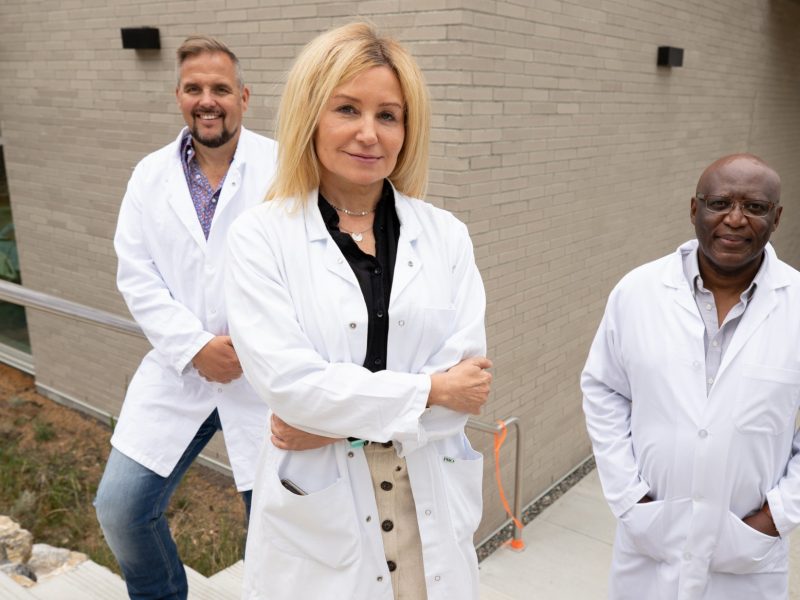
What can veterinary medicine, analytical chemistry and microbiology teach us about COVID-19? A trio of Thompson Rivers University researchers expect that answer to be: plenty.
Supported by a $50,000 NSERC Alliance Grant, Drs. John Church, Joanna Urban and Kingsley Donkor are working toward the development of an antiviral nasal spray and mouthwash using high-cannabidiol (CBD) extracts, terpenes, and nitric oxide with the goal of preventing the spread of COVID-19.
As part of the research, the scientists have partnered with SaNOtize Research and Development, a life-science biotech firm based in Vancouver, and Avicanna Inc., a Canadian biopharmaceutical company that develops medical cannabis-based products. The research at TRU will be conducted using state-of-the-art 3D tissue models to simulate human testing.
“The coronavirus is not going away. I wish it was. And it might be a long time before we get a vaccine, so coming up with a novel treatment is something the world desperately needs,” said Church.
What we know about how the virus works
In the seven months that the SARS-CoV2 coronavirus has gripped the world, scientists have made significant strides in understanding how the virus works by isolating its receptor cells, said Church. The idea behind this research is to block the entry of the virus into the body, and several CBD extracts have already shown promise. Scientists have also found that patients infected with COVID-19 benefit from the use of inhaled nitric oxide (NO). Since 2004, Church has been successfully using NO as an antiviral therapy for the prevention of bovine respiratory disease in feedlot cattle, and it has also proven effective against bovine coronavirus.
“We’ve always had silos where we look at diseases in isolation, but we need to take a multidisciplinary approach and start to combine veterinary medicine and human medicine,” said Church, who is the BC Regional Innovation Chair in Cattle Industry Sustainability. “Many of these new viruses start in animals first and transfer to humans.”
A multidisciplinary team
While Church brings his knowledge of veterinary medicine to the team, Donkor, a professor of chemistry, uses ultra-high performance liquid chromatography and capillary electrophoresis to conduct the chemical analysis of the CBD extracts and terpenes, while Urban conducts molecular and microbiological tissue testing to measure effectiveness.
Without a vaccine, it is hoped the knowledge gathered through this research can inform some of the treatment and prevention options, as so far, there is no effective treatment and traditional antiviral drug therapies have been ineffective.
“We could use this product in nursing homes, as it also has anti-inflammatory properties. This could be huge, and not just for the one year of the project, but for many more years to come as we investigate and see how cannabinoids can help us prevent virus spread,” said Urban.
Treatment may be in a nasal spray or mouthwash
Church sees this project as an extension of the research he began with Donkor several years ago to prevent shipping fever in cattle.
“I envision a device — a nasal spray or a mouthwash — that you can put in every purse or pocket. If you have been in close contact with someone who has the virus you could use this pre-treatment to potentially block the infection,” he said.
“We are trying to provide knowledge,” said Donkor.
“We are going to investigate this mechanism and get information about how this mechanism blocks virus receptors, and we will share this information with the scientific community,” he said, adding that he hopes other researchers will use this knowledge and move this research through various stages of testing.
“These products we are using are generally regarded as safe. They have all had approvals from Health Canada, and can actually get into the hands of people quite quickly,” he said.
 Online harms bill on hold
Online harms bill on hold BC boosts milk production
BC boosts milk production Baby lives after stroller hit
Baby lives after stroller hit Plastic treaty talks underway
Plastic treaty talks underway UN workers charged
UN workers charged  Trudeau in Saskatoon
Trudeau in Saskatoon  U.S. reporter remains jailed
U.S. reporter remains jailed $620 million for Ukraine
$620 million for Ukraine  5 die crossing channel
5 die crossing channel PepsiCo beats Q1 forecasts
PepsiCo beats Q1 forecasts Equifax testing rental data
Equifax testing rental data  Tourism operators struggle
Tourism operators struggle  Leafs even series
Leafs even series Cristall gets pro look
Cristall gets pro look Warriors even series in OT
Warriors even series in OT Seinfeld: movie biz is 'over'
Seinfeld: movie biz is 'over' A Knight's Tale sequel axed
A Knight's Tale sequel axed Rudolph: I'm no nepo baby
Rudolph: I'm no nepo baby




